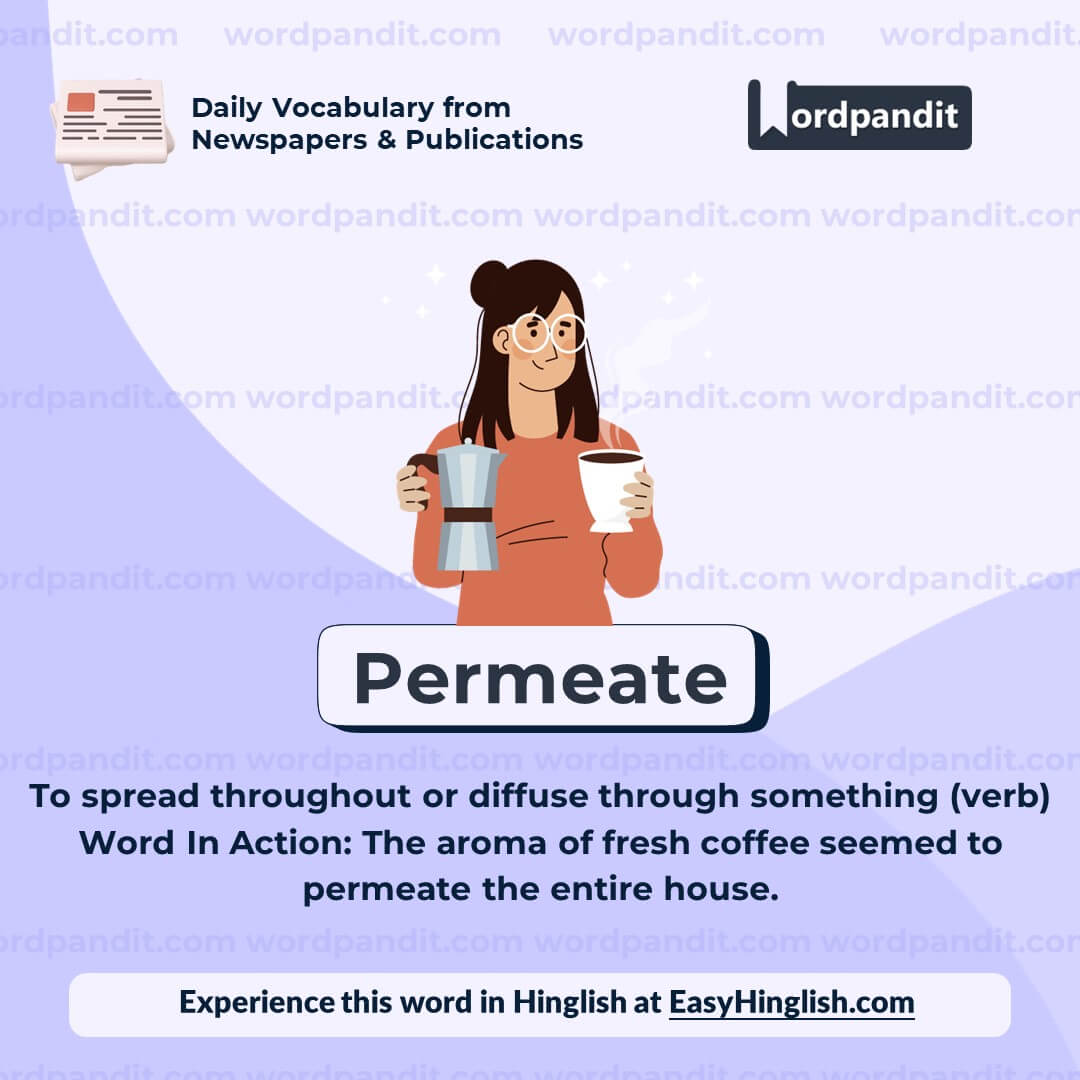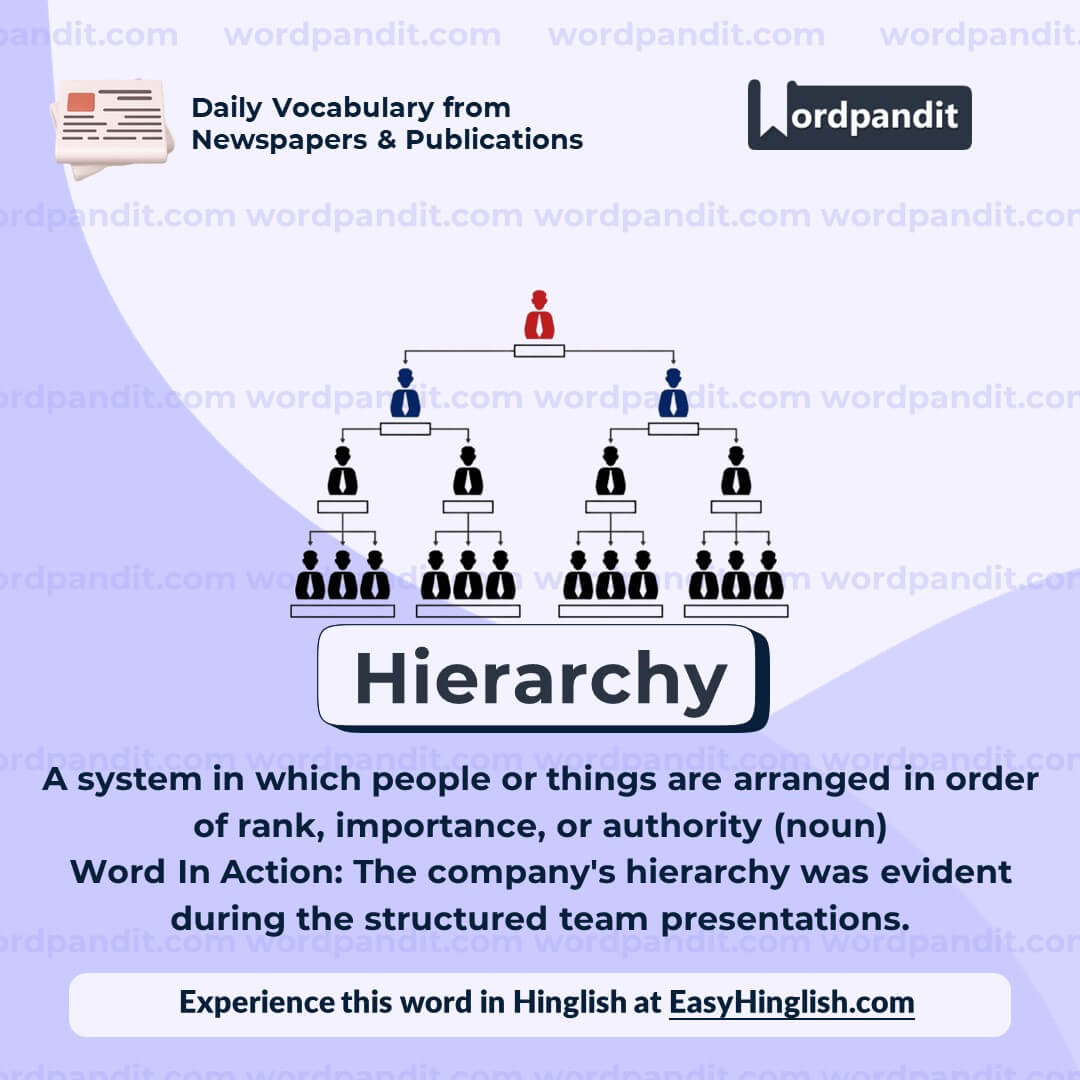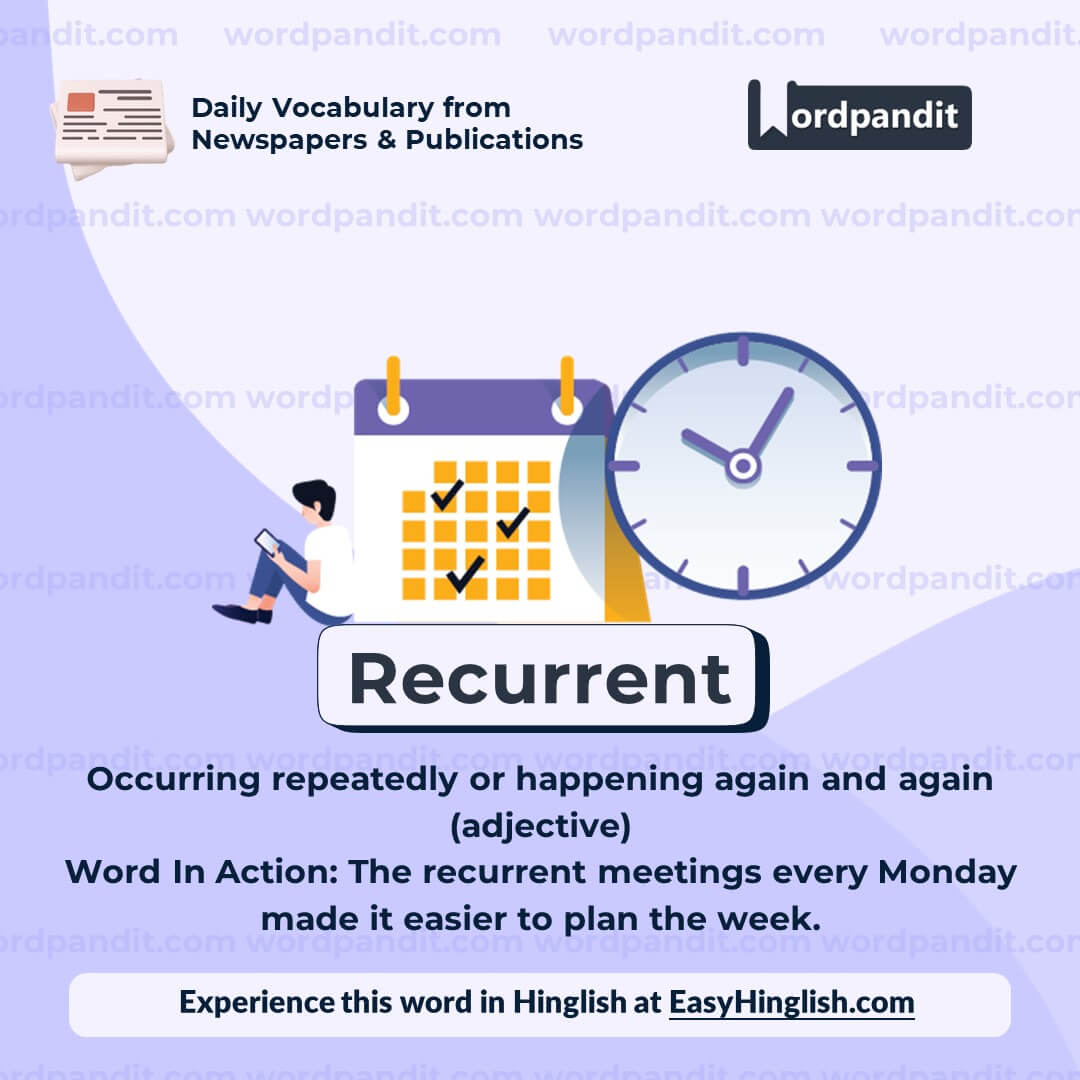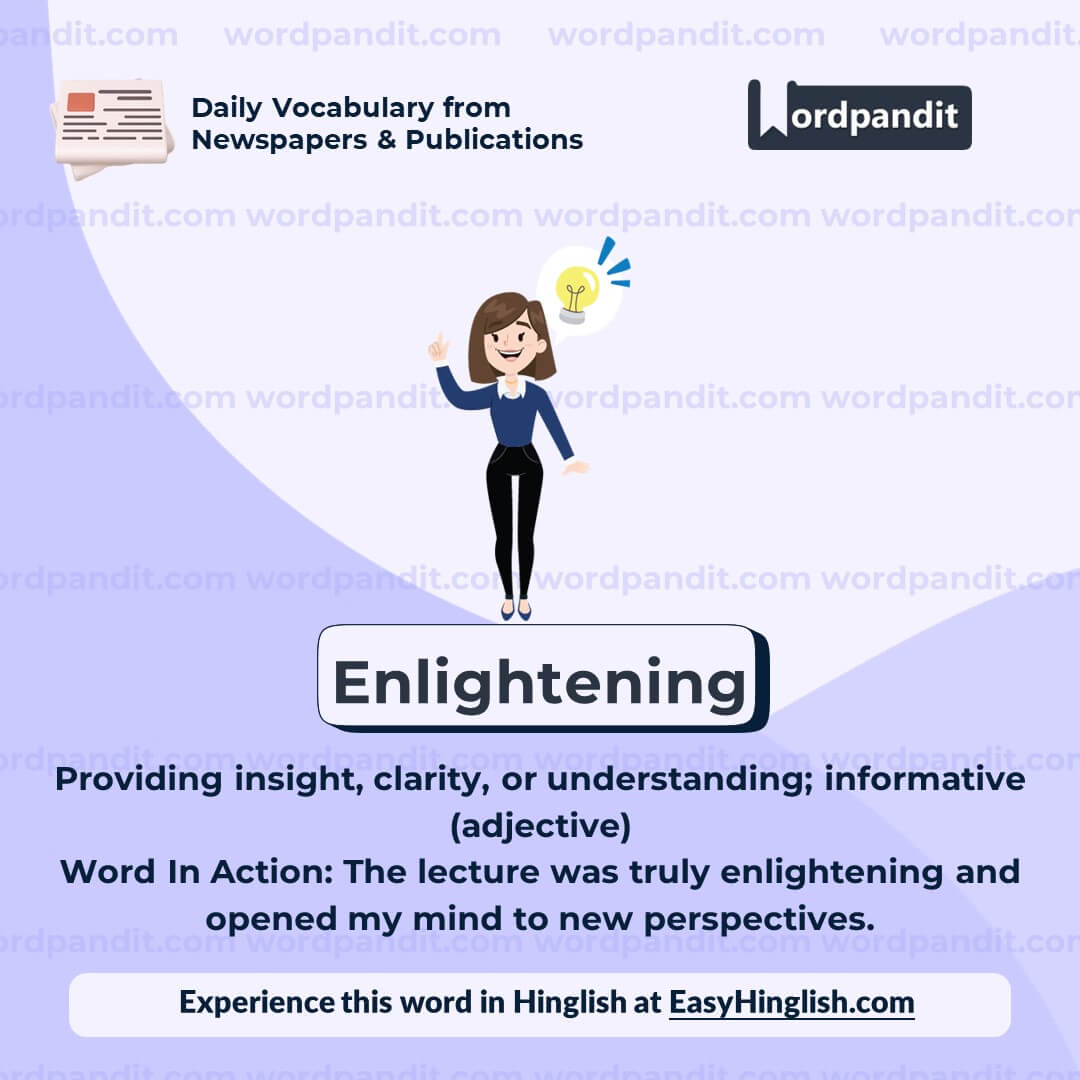Daily Vocabulary from International Newspapers and Publications
Expand Your Vocabulary with Wordpandit’s Global Vocabulary Hub
At Wordpandit, we are committed to helping you develop a truly global vocabulary by drawing from some of the most respected international publications. This section is designed to keep you ahead of the curve by introducing you to words that define global conversations and trends.
The Power of Global Sources
To help you think and communicate on a global scale, we curate vocabulary from renowned international sources, such as:
- The New York Times
- The Washington Post
- BBC
- The Guardian
- The Economist
- Scientific American
- Psychology Today
- And many more...
Stay Global, Stay Competitive
Our daily updates from international publications ensure you are consistently exposed to new words that reflect global news and developments, making sure your vocabulary is not only current but also globally relevant.
Enhance Your Global Perspective
Whether you’re preparing for international exams, aiming to excel in global business communication, or want to enhance your language skills for personal growth, Wordpandit offers the resources you need to thrive in a global context.
Effective Learning, Global Reach
Our learning methodology combines global examples, memory aids, and interactive activities, allowing you to internalize new words effectively and apply them in real-world scenarios.
Begin Your Global Vocabulary Journey Now!
Why Choose Wordpandit?
Practical Learning: Focus on words you'll actually encounter in real-world reading, enhancing your comprehension and communication skills.
Diverse Content: From current affairs to scientific breakthroughs, our varied sources expose you to vocabulary across multiple domains.
Effortless Integration: Make Wordpandit a part of your daily routine. Just a few minutes each day can significantly boost your lexicon over time.
Your Path to Vocabulary Mastery
- Visit our Daily Vocabulary section regularly
- Explore new words and their usage in context
- Practice incorporating these words into your own writing and speech
- Track your progress as your vocabulary expands
Start Your Journey Today
Embark on your vocabulary enhancement journey with Wordpandit. By consistently engaging with our daily posts, you'll build a robust vocabulary that serves you well in academic, professional, and personal contexts.
Remember, a word a day keeps linguistic limitations at bay. Make Wordpandit your daily companion in the quest for vocabulary excellence!
WORD-1: Permeate
Context:
"Often unseen at first, it begins to permeate the way a person thinks, feels, behaves. Over time, it can grow bolder and weigh more heavily, until, at its worst, it surrounds the person." - Psyche
Explanatory Paragraph:
The word "permeate" refers to the act of spreading or diffusing through something, often in a gradual or subtle way. It describes how something can infiltrate and saturate an object, place, or even abstract ideas like thoughts or emotions. The process is usually thorough and pervasive, leaving little unaffected.
Meaning: To spread throughout or diffuse through something (verb).
Pronunciation: PUR-mee-ayt
Difficulty Level: ⭐⭐ Beginner to Intermediate
Etymology: From Latin "permeare," meaning "to pass through," derived from "per" (through) + "meare" (to go).
Synonyms & Antonyms:
Synonyms: infiltrate, saturate, diffuse, penetrate, seep
Antonyms: block, resist, contain
Usage Examples:
- The aroma of freshly baked bread began to permeate the entire house.
- Over time, her positive attitude started to permeate the team's mindset, improving morale.
- Fear seemed to permeate the crowd as the storm clouds gathered above.
- The artist’s unique style has permeated the modern art scene, influencing many new creators.
Cultural Reference:
"The idea of mindfulness has permeated modern culture, shaping how people approach mental health and well-being." - Common discussion in wellness communities.
Think About It:
How does the concept of "permeation" apply to societal changes, such as the spread of new technologies or ideas?
Quick Activity:
Think of an example where a specific smell, idea, or emotion has permeated your environment or mind recently. Write a short paragraph describing it.
Memory Tip:
Remember "permeate" by associating it with "permit" + "through"—it permits something to spread all the way through something else.
Real-World Application:
In business, strong company values can permeate the organizational culture, influencing how employees behave and make decisions. Similarly, in science, substances like gases or liquids can permeate porous materials, which is a key concept in fields like chemistry and environmental studies.
WORD-2: Fatigue
Context:
"Physical symptoms: among these possible symptoms are fatigue and lethargy; feeling achy or heavy in the body; a loss of appetite or, conversely, an urge to eat for comfort; or disrupted sleep patterns." - Psyche
Explanatory Paragraph:
"Fatigue" refers to an overwhelming sense of tiredness, lack of energy, or physical and mental exhaustion. It can be caused by physical activity, mental stress, illness, or inadequate rest. Unlike ordinary tiredness, fatigue often persists even after rest, and it can affect a person’s ability to function effectively in their daily activities.
Meaning: Extreme tiredness resulting from mental or physical exertion or illness (noun).
Pronunciation: fuh-TEEG
Difficulty Level: ⭐ Beginner
Etymology: From French "fatigue," originating from Latin "fatigare," meaning "to tire out."
Synonyms & Antonyms:
Synonyms: exhaustion, weariness, lethargy, tiredness, burnout
Antonyms: energy, vitality, liveliness, vigor
Usage Examples:
- After working long hours for several weeks, she began to experience severe fatigue and needed a break.
- The marathon runners were overcome with fatigue as they approached the finish line.
- Chronic fatigue can be a symptom of underlying health conditions like anemia or depression.
- Despite her fatigue, she pushed through the final stages of the project with determination.
Cultural Reference:
"The term 'compassion fatigue' is widely used to describe the emotional exhaustion experienced by caregivers and healthcare workers who are constantly exposed to the suffering of others." - Common term in psychology and healthcare.
Think About It:
Why do you think modern lifestyles often contribute to chronic fatigue, and how can we counteract this trend?
Quick Activity:
Write a short list of three activities or habits that you can adopt to reduce fatigue in your daily life. Reflect on how they might help.
Memory Tip:
Think of "fatigue" as "fat + energy gone" to remind you it describes a state of extreme tiredness when your energy feels completely used up.
Real-World Application:
Fatigue is a common issue in high-pressure professions, such as healthcare and aviation, where long shifts and stressful conditions can lead to burnout. Understanding and addressing fatigue is crucial for maintaining productivity and mental health in both personal and professional contexts.
WORD-3: Hierarchy
Context:
"Teaching, too, can reflect the ethos of the Vietnam memorial as Scott saw it: egalitarian, open and participatory, with a preference not for parsimony over loud claims but critical thought and experience over intellectual hierarchies." - Aeon
Explanatory Paragraph:
The word "hierarchy" refers to a system or organization in which people or things are ranked one above the other according to status, authority, or importance. It is often used to describe social, organizational, or conceptual structures where certain levels or tiers are deemed more significant than others. Hierarchies exist in many aspects of life, such as workplaces, governments, and even ideas.
Meaning: A system in which people or things are arranged in order of rank, importance, or authority (noun).
Pronunciation: HAI-uh-rahr-kee
Difficulty Level: ⭐⭐⭐ Intermediate
Etymology: From Greek "hierarchia," meaning "rule of a high priest," derived from "hieros" (sacred) + "archein" (to rule).
Synonyms & Antonyms:
Synonyms: ranking, pecking order, chain of command, tier, order
Antonyms: equality, flat structure, egalitarianism
Usage Examples:
- The corporate hierarchy ensures that decisions are made by those at the top of the organization.
- In ancient societies, hierarchies were often determined by birthright rather than merit.
- The school aimed to create an environment free from rigid hierarchies, encouraging collaboration among students and teachers.
- Religious hierarchies often dictate the roles and responsibilities of individuals within the institution.
Cultural Reference:
"The caste system in India is one of the most historically significant examples of a social hierarchy, with rigid layers that dictated people's roles in society for centuries." - Historical reference
Think About It:
How can we balance the need for hierarchy in organizations with the desire for equality and inclusivity in modern society?
Quick Activity:
Draw a diagram of a hierarchy you encounter in daily life, such as in your workplace, family, or school. Label the different levels and reflect on how they interact.
Memory Tip:
Think of "hierarchy" as a "high-archy," where "high" represents the top levels in a ranking system.
Real-World Application:
Hierarchies are essential in fields like management and government, where a clear structure ensures order and accountability. However, understanding hierarchies also helps in identifying inequalities and finding ways to create more inclusive systems, such as flat organizational models in startups.
WORD-4: Recurrent
Context:
"Depression can also be a recurrent condition, with periods of depression (lasting weeks or months) and periods of recovery (lasting weeks, months, or years). Sometimes, depression is a one-off episode that a person recovers from and does not experience again." - Psyche
Explanatory Paragraph:
The word "recurrent" describes something that happens repeatedly or occurs again and again over a period of time. It suggests a pattern where an event, condition, or phenomenon keeps returning, often at regular or irregular intervals. Recurrent can refer to both physical events (like a recurring pain) and abstract concepts (like recurring thoughts or emotions).
Meaning: Occurring repeatedly or happening again and again (adjective).
Pronunciation: ree-KUR-uhnt
Difficulty Level: ⭐⭐ Beginner to Intermediate
Etymology: From Latin "recurrentem," the present participle of "recurrere," meaning "to run back" or "to return."
Synonyms & Antonyms:
Synonyms: repeated, cyclical, periodic, intermittent, frequent
Antonyms: rare, isolated, one-time, unique
Usage Examples:
- The recurrent floods in the region have forced many families to relocate to safer areas.
- Her recurrent headaches prompted her to visit a neurologist for further evaluation.
- The team struggled to address the recurrent issues with their software, which frustrated users.
- Recurrent themes of hope and resilience can be found throughout the poet’s body of work.
Cultural Reference:
"In history, the rise and fall of civilizations often show recurrent patterns of growth, decline, and rebirth." - Common historical observation
Think About It:
Why do you think certain problems or challenges in life tend to be recurrent, and how can we effectively break these cycles?
Quick Activity:
Identify a recurrent habit or pattern in your own life, whether positive or negative. Write down steps you could take to either reinforce it (if it’s good) or break it (if it’s harmful).
Memory Tip:
Think of "recurrent" as something that 're-curs'—it reappears or returns, like waves in the ocean or seasons in a year.
Real-World Application:
Recurrent patterns are common in health, such as chronic illnesses that return over time, or in business, where companies deal with recurring issues like market fluctuations. Understanding and anticipating recurrent events allows for better preparation and management in both personal and professional contexts.
WORD-5: Enlightening
Context:
"This crisis explains some of the others, though – and gives an enlightening perspective on some of the tensions in our everyday lives." - Psyche
Explanatory Paragraph:
The word "enlightening" refers to something that provides greater knowledge, understanding, or insight about a topic. It describes experiences, explanations, or ideas that help illuminate a subject, making it clearer or more comprehensible. Often, enlightening moments shift our perspective and expand our awareness.
Meaning: Providing insight, clarity, or understanding; informative (adjective).
Pronunciation: en-LAHY-tuhn-ing
Difficulty Level: ⭐ Beginner
Etymology: From "enlighten," which originates from the Old English "inlihtan," meaning "to illuminate" or "to shed light upon."
Synonyms & Antonyms:
Synonyms: illuminating, informative, eye-opening, revealing, clarifying
Antonyms: confusing, puzzling, misleading, obscure
Usage Examples:
- The teacher's lecture on climate change was enlightening, offering new insights into the effects of human activity on the planet.
- Her travel experiences were enlightening, helping her understand different cultures and perspectives.
- The book provided an enlightening overview of the history of philosophy.
- The debate was an enlightening experience, as it exposed both sides of the argument clearly and thoughtfully.
Cultural Reference:
"The Enlightenment," an intellectual and cultural movement of the 17th and 18th centuries, emphasized reason, science, and individualism over tradition and superstition, profoundly influencing modern thought and society.
Think About It:
What is one enlightening experience or piece of knowledge that changed the way you see the world?
Quick Activity:
Think of a recent conversation, book, or experience that you found enlightening. Write a short paragraph describing what you learned and how it changed your perspective.
Memory Tip:
Picture "enlightening" as turning on a light bulb in your mind—it helps you see clearly and understand better.
Real-World Application:
Enlightening experiences are valuable in education, personal growth, and problem-solving. Teachers, mentors, and leaders strive to provide enlightening moments to guide others toward better understanding and informed decisions.
















